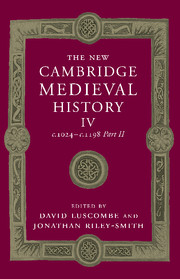Book contents
- Frontmatter
- 1 Introduction
- 2 The papacy, 1024–1122
- 3 The western empire under the Salians
- 4 Italy in the eleventh century
- 5 The kingdom of the Franks to 1108
- 6 Spain in the eleventh century
- 7 England and Normandy 1042–1137
- 8 The Byzantine Empire, 1025–1118
- 9 Kievan Rus’, the Bulgars and the southern Slavs, c. 1020 – c. 1200
- 10 Poland in the eleventh and twelfth centuries
- 11 Scandinavia in the Eleventh and Twelfth Centuries
- 12 Hungary in the Eleventh and Twelfth Centuries
- 13 The papacy, 1122–1198
- 14 The western empire, 1125–1197
- 15 Italy in the twelfth century
- 16 Spain in the twelfth century
- 17 The kingdom of the Franks from Louis VI to Philip II
- 18 England and the Angevin dominions, 1137–1204
- 19 Scotland, Wales and Ireland in the Twelfth Century
- 20 The Byzantine Empire, 1118–1204
- 21 The Latin East, 1098–1205
- 22 ’Abbasids, Fatimids and Seljuqs
- 23 Zengids, Ayyubids and Seljuqs
- Appendix: genealogical tables
- List of primary sources
- Bibliography of Secondary Works Arranged by Chapter
- Index
- Map 1a The western empire: Burgundy and Provence in the eleventh century"
- Map 1b The western empire: Germany and the north-eastern frontier of Christendom in the eleventh century"
- Map 3 The kingdom of the Franks"
- Map 4 England and Normandy"
- Map 10 Germany under Frederick Barbarossa, c. 1190">
- Map 12 The Angevin empire"
- References
13 - The papacy, 1122–1198
Published online by Cambridge University Press: 28 March 2008
- Frontmatter
- 1 Introduction
- 2 The papacy, 1024–1122
- 3 The western empire under the Salians
- 4 Italy in the eleventh century
- 5 The kingdom of the Franks to 1108
- 6 Spain in the eleventh century
- 7 England and Normandy 1042–1137
- 8 The Byzantine Empire, 1025–1118
- 9 Kievan Rus’, the Bulgars and the southern Slavs, c. 1020 – c. 1200
- 10 Poland in the eleventh and twelfth centuries
- 11 Scandinavia in the Eleventh and Twelfth Centuries
- 12 Hungary in the Eleventh and Twelfth Centuries
- 13 The papacy, 1122–1198
- 14 The western empire, 1125–1197
- 15 Italy in the twelfth century
- 16 Spain in the twelfth century
- 17 The kingdom of the Franks from Louis VI to Philip II
- 18 England and the Angevin dominions, 1137–1204
- 19 Scotland, Wales and Ireland in the Twelfth Century
- 20 The Byzantine Empire, 1118–1204
- 21 The Latin East, 1098–1205
- 22 ’Abbasids, Fatimids and Seljuqs
- 23 Zengids, Ayyubids and Seljuqs
- Appendix: genealogical tables
- List of primary sources
- Bibliography of Secondary Works Arranged by Chapter
- Index
- Map 1a The western empire: Burgundy and Provence in the eleventh century"
- Map 1b The western empire: Germany and the north-eastern frontier of Christendom in the eleventh century"
- Map 3 The kingdom of the Franks"
- Map 4 England and Normandy"
- Map 10 Germany under Frederick Barbarossa, c. 1190">
- Map 12 The Angevin empire"
- References
Summary
you ought to bear in mind that you are the model of righteousness, the mirror of sanctity, the pattern of piety, the declarer of truth, the defender of the faith, the teacher of the nations, the leader of Christians, the friend of the Bridegroom, the Bridesman, the ordainer of the clergy, the shepherd of the people, the master of the simple, the refuge of the oppressed, the advocate of the poor, the hope of the wretched, the protector of the orphans, the judge of the widows, the eye of the blind, the tongue of the dumb, the support of the old, the punisher of crimes, the dread of the wicked, the glory of the good, a rod for the powerful, a hammer of tyrants, the father of kings, the moderator of the laws, the dispenser of the canons, the salt of the earth, the light of the world, the priest of the Most High, the vicar of Christ, the Lord’s anointed: finally, the God of Pharaoh.
This influential description of the spiritual, judicial and charismatic elements of the pope’s authority is found in the treatise De consideratione (1148/9–1152/3) which Bernard of Clairvaux addressed to his former pupil, Pope Eugenius III. The author drew especially on the language of the Old Testament, including his favourite imagery from the Song of Solomon: ‘the Bride’ of that book was Bernard’s most frequent image for the church; ‘the friend of the Bridegroom’ (that is, of Christ) was his characteristic term for the pope. The Old Testament prophets and patriarchs also inspired him with striking images of papal intervention in the church and the world, notably that final designation in his list of papal titles, which would so much preoccupy the theologians and canonists of the later middle ages.
Keywords
- Type
- Chapter
- Information
- The New Cambridge Medieval History , pp. 317 - 383Publisher: Cambridge University PressPrint publication year: 2004
References
- 2
- Cited by

